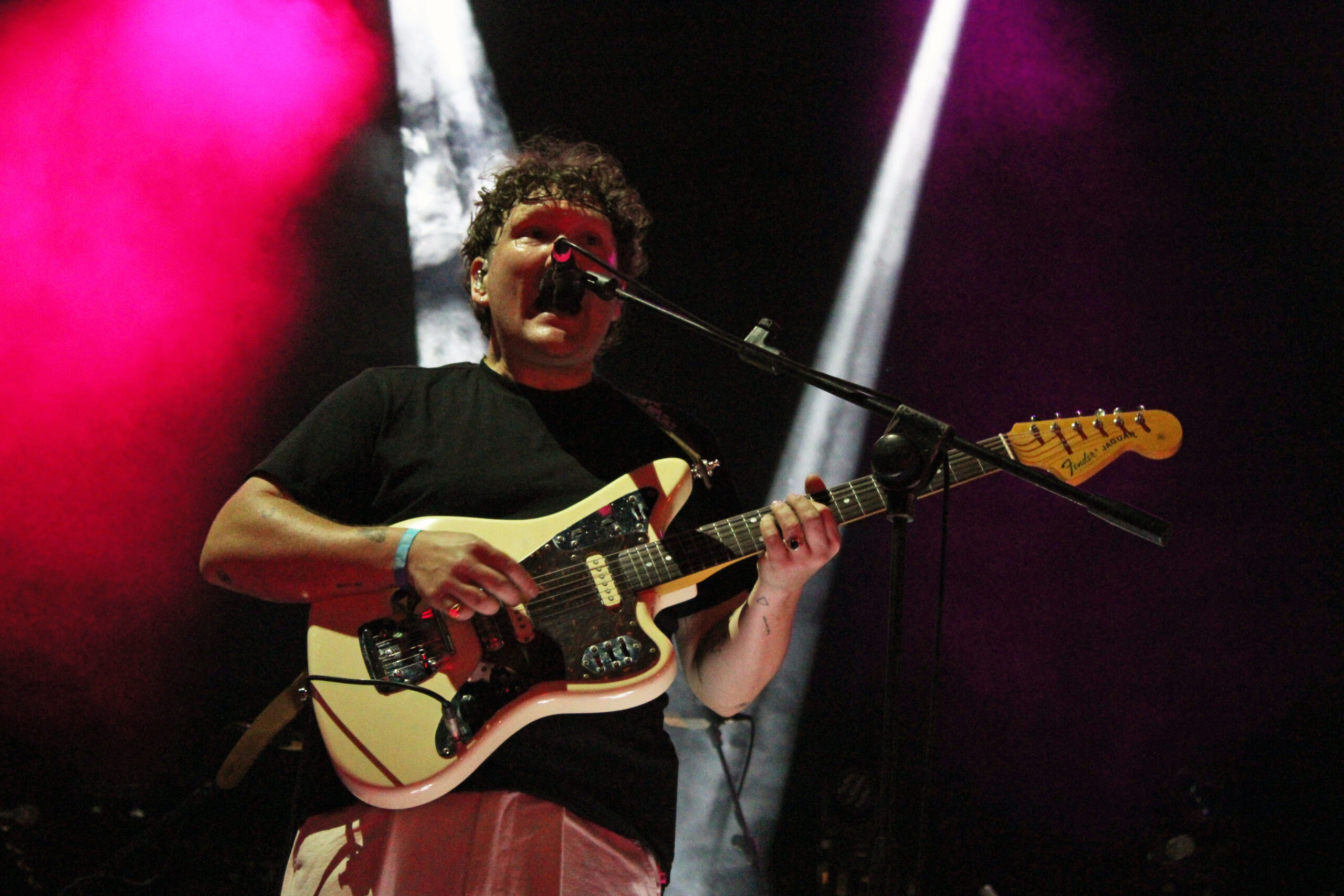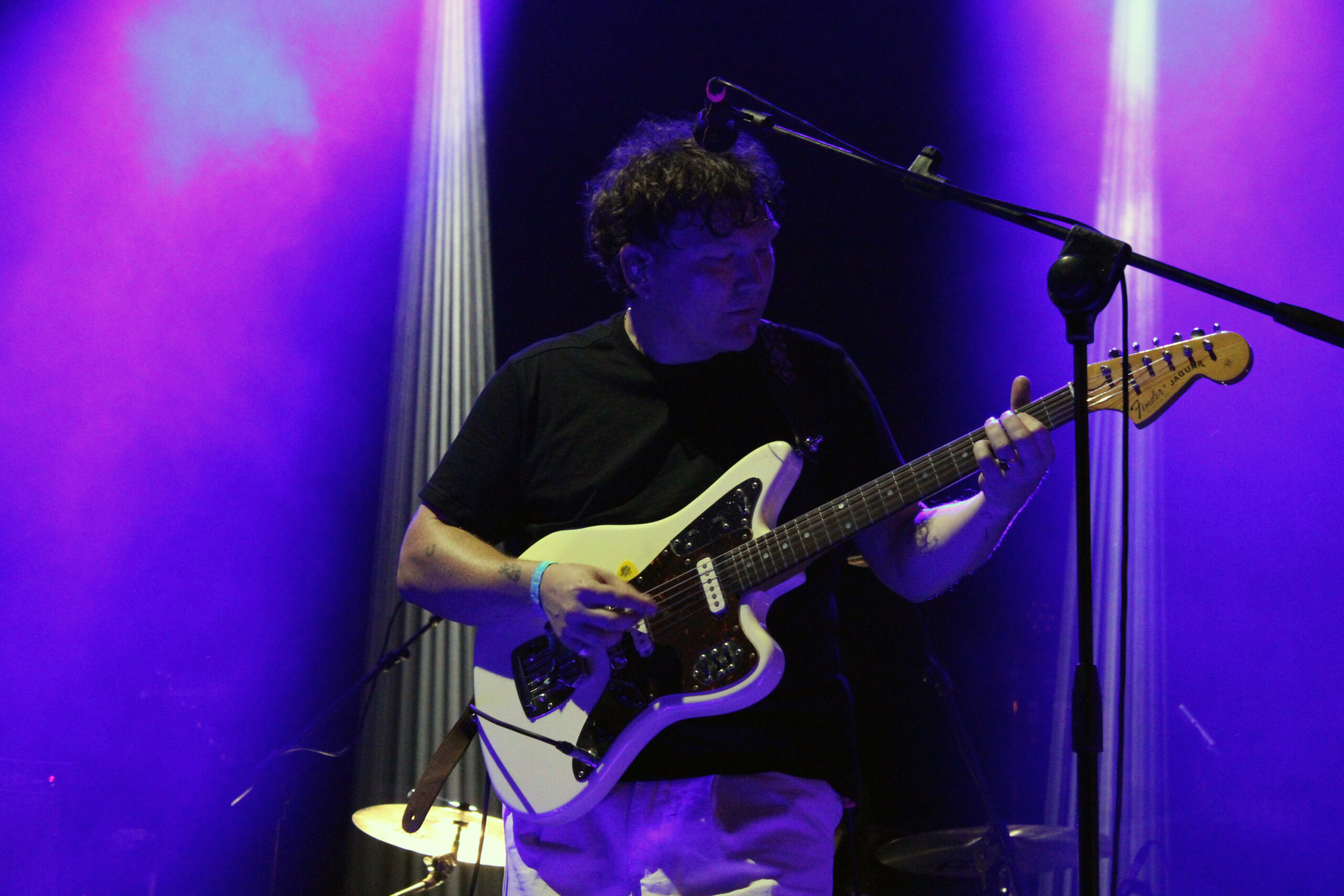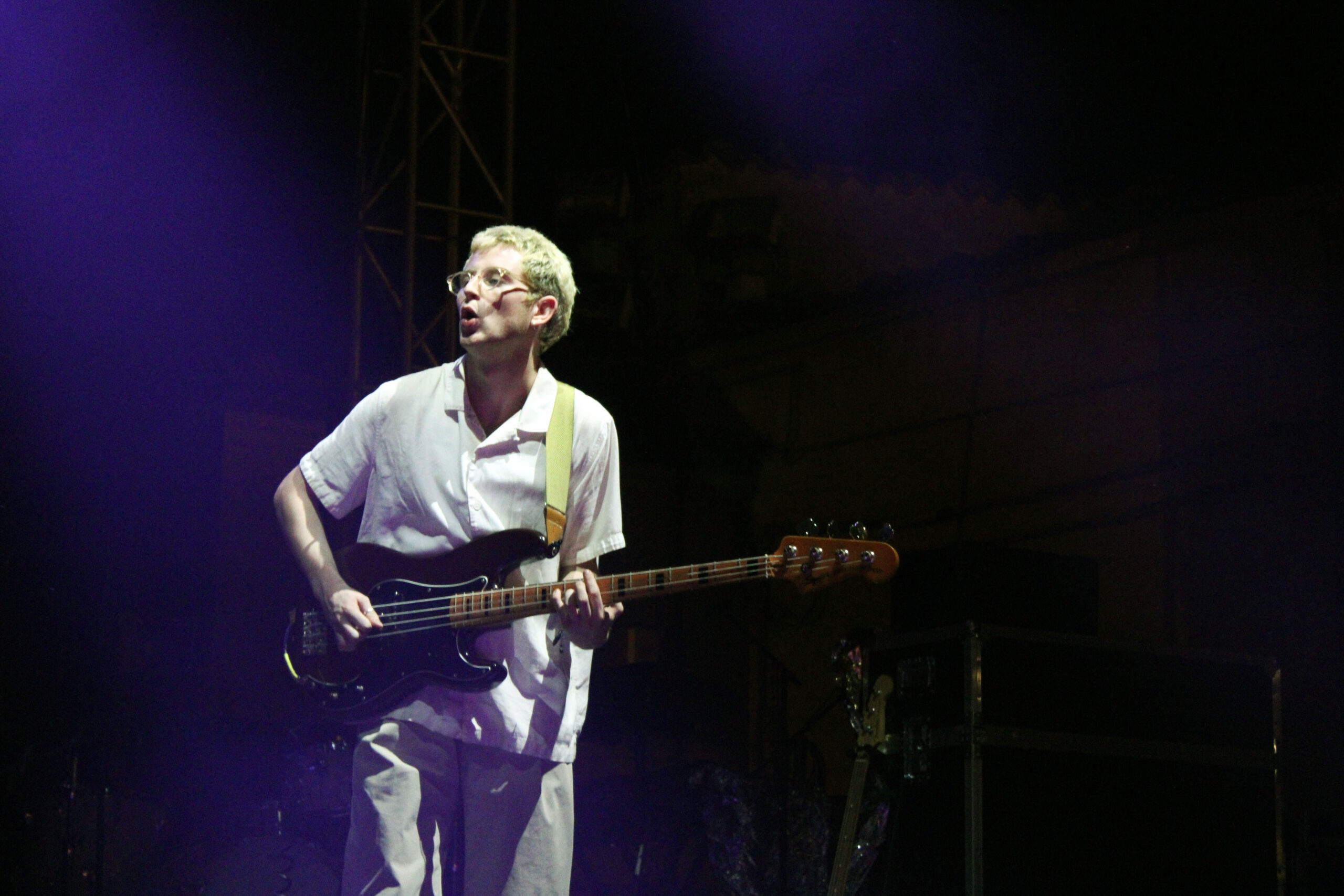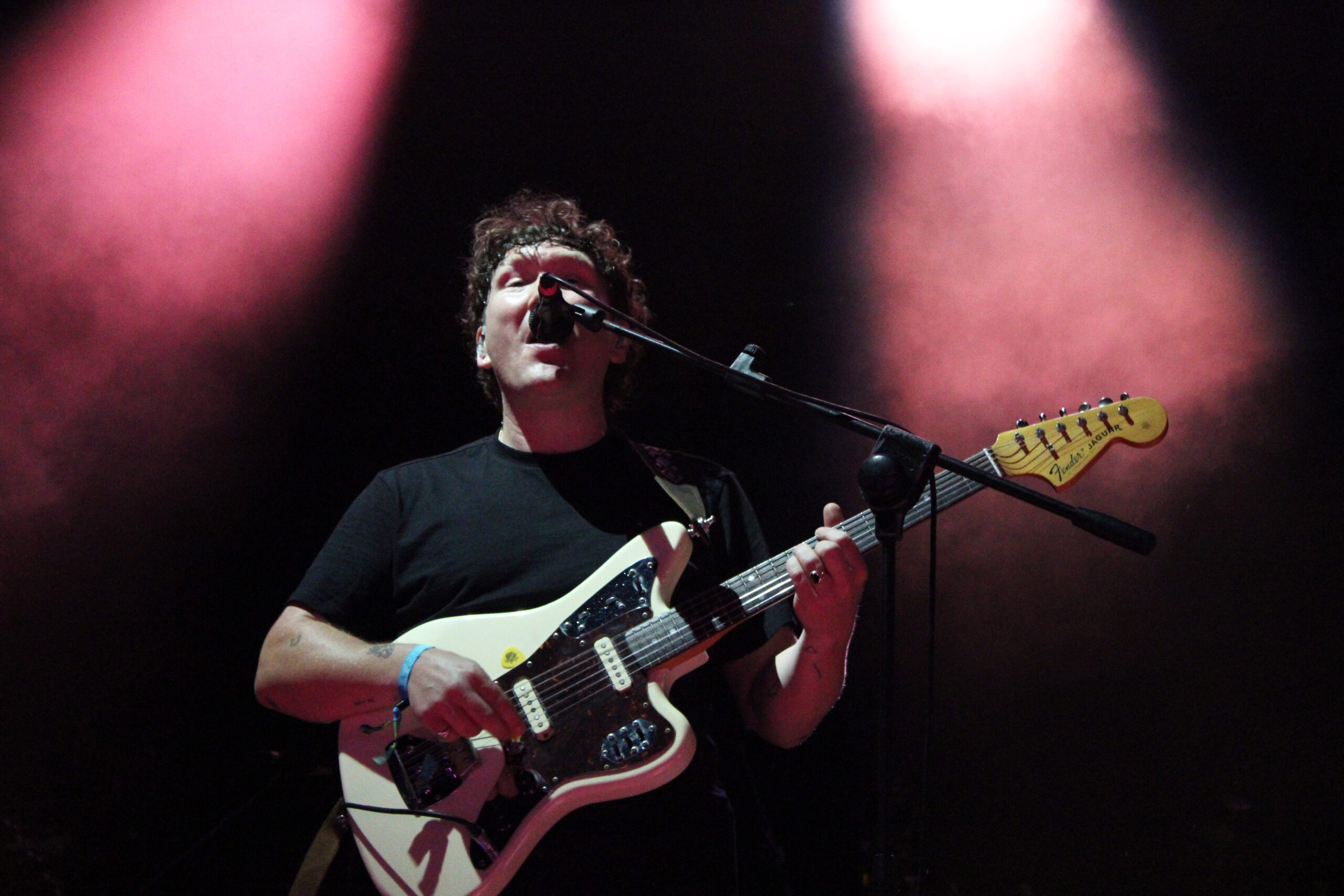In una delle mattine di Ypsigrock abbiamo intervistato i Pale Blue Eyes, con cui abbiamo discusso della loro esibizione, dell’album in arrivo e di Brexit.
È la mattina di venerdì 11 agosto a Castelbuono e, seduti con noi al tavolo di un bar davanti a dei calzoni caldi e un caffè americano, ci sono i coniugi Matt e Lucy Board, rispettivamente voce/chitarra e batteria dei Pale Blue Eyes. Della band fa parte anche Aubrey Simpson, al basso.
Il trio inglese si è esibito la sera prima sull’Ypsi Once Stage durante il Day 1 di questa edizione di Ypsigrock, in quello che è stato il suo primo show in assoluto sul suolo italiano.
Di seguito il testo dell’intervista.
[ITA]
Bene, ragazzi: iniziamo con le sensazioni a caldo del concerto di ieri sera…
Matt: È stato un vero privilegio esibirsi. Stavamo giusto parlando del senso di comunità che offre questo fantastico posto. Un’esperienza da fare almeno una volta nella vita e che sicuramente custodiremo.
Dal punto di vista visivo, con il castello, la folla e tutto il contesto, è stata un’esperienza incredibile.
Sapevate che qualche giorno fa Rachel Goswell degli Slowdive ha pubblicizzato il vostro concerto su Instagram dicendo di non perdere i Pale Blue Eyes al festival?
M.: È stato così carino da parte sua! Siamo stati abbastanza fortunati da rimanere stasera e poter vedere gli Slowdive. Poi avremo un concerto domenica nel Regno Unito, quindi partiremo domani mattina presto. Altrimenti non ce ne saremmo mai andati!
Parliamo un po’ di musica. Il vostro secondo album This House uscirà il primo settembre. Qual è la principale differenza tra questo album e il primo lavoro Souvenirs?
M.: Ci sono somiglianze, ma penso che ci siano molti momenti che rappresentano la fine di un’era in questo disco, come andare via dalla casa di famiglia, cambiare completamente location nel Regno Unito. È quasi come una fine ma anche un punto di partenza. Anche se spesso diciamo che è una specie di fratello del primo disco, ci sono stati molti cambiamenti.
Lucy: Musicalmente alcune delle tracce sono state in effetti create in un momento simile, a causa del lockdown. La fine della realizzazione di Souvenirs era il momento in cui non potevamo esibirci, eravamo a casa tutti i giorni. Abbiamo continuato a fare canzoni, quindi anche se avevamo finito e scelto le tracce che sarebbero andate nel primo album, in realtà c’erano alcuni pezzi su cui stavamo già lavorando. Anche se poi stavamo ancora registrando della roba nel dicembre 2022 quando la scadenza era gennaio 2023. Due o tre brani dell’album sono realizzati in modi leggermente diversi. Quando io, Matt e Aubrey eravamo tutti insieme, registravamo e suonavamo, mentre con il primo album questo non accadeva.
M.: Aggiungo che c’è un po’ più di sperimentazione nel secondo disco, perché ovviamente non volevamo usare lo stesso suono e le stesse cose che avevamo utilizzato nel primo. Abbiamo nuove attrezzature e ci sono nuove tecniche che sono state applicate a questo secondo lavoro.
L.: E un paio di nuovi sintetizzatori.
Ho letto che possedete un vostro studio. Avete registrato lì quest’ultimo album?
M.: Entrambi sono registrati in quello studio.
L.: Beh, quando abbiamo iniziato a fare il primo album, non avevamo uno studio. Provavamo a casa di amici o a Plymouth.
Penso che Chelsea sia stata una delle prime tracce che abbiamo registrato e non credo che a quel punto avessimo uno studio finito. Stavamo costruendo il nostro studio e lì abbiamo registrato solo alcune delle tracce.
Il secondo album è stato invece interamente registrato in quello studio.
Penso che il vantaggio di avere uno studio tutto vostro sia avere più tempo a disposizione…
M.: Sono totalmente d’accordo. Ricordo una delle mie vecchie lezioni quando dicevano “Il tempo è il migliore amico di un artista”. Hai bisogno di tempo per sviluppare e approfondire. Nell’ultima sessione che abbiamo fatto, sapevamo di avere l’80% del disco pronto ma non ne eravamo ancora completamente contenti.
Abbiamo finito per registrare a Natale e siamo rimasti solo noi tre in studio per una settimana, tutti gli altri erano in vacanza.
La bevuta di Natale è stata in studio!
E quello studio è nella vostra città, Totnes?
M.: Lo era, ma un paio di mesi fa ci siamo trasferiti a Sheffield. Avevamo un piano per avere una visione un po’ diversa, perché io ho vissuto lì praticamente tutta la mia vita.
Ecco, com’è vivere in un posto come il Devon dal punto di vista di un musicista? Ci si sente un po’ isolati dai centri della scena musicale britannica?
M.: È magnifico per scrivere e concentrarsi sull’arte perché hai molto tempo e non ci sono distrazioni, quindi puoi davvero scavare in profondità. Ma a volte sei abbastanza isolato. Per essere in tour guidiamo fino a Bristol e sono due ore e mezza da casa. Poi quando torni a casa, dici: “oh ma questo posto è incredibile e così bello!”
L.: Era tranquillo ed era bellissimo. Il luogo in cui vivevamo è piuttosto remoto. Tutto intorno ci sono solo campi. In riferimento a ciò di cui parli, ovvero qualsiasi tipo di scena musicale o altre band che stanno facendo qualcosa di simile a quello che facciamo, non c’era più molto per noi a Totnes.
M.: Il mio cuore è a Totnes. Ma per le cose di cui stavamo parlando, come i cambiamenti che ti mettono alla prova, avevamo bisogno di un piccolo rimescolamento personale, quindi tutto sembrava allinearsi e ci ha dato una scusa per provare qualcosa di nuovo. E Dean, il produttore con cui lavoriamo, è a Sheffield. Lucy è originaria di Sheffield. Abbiamo trovato un posto davvero incantevole che ci fa subito sentire come a casa. Stiamo costruendo uno studio di registrazione lì.
Quindi avrete due studi!
M.: Oh no, quello vecchio non c’è più.
L.: Abbiamo impiegato due/tre anni a costruire e finire lo studio nel Devon e poi è successo che abbiamo dovuto vendere la casa della famiglia di Matt, che aveva anche lo studio sul retro. È però servito allo scopo, perché lì abbiamo fatto due album.
Lucy, tu sei proprio di Sheffield. So che hai scritto una tesi sulla scena musicale alternativa della città tra il 1973 e il 1978, con particolare riferimento ai Cabaret Voltaire. Cosa hai portato di quella scena nella musica dei Pale Blue Eyes?
L.: Penso di aver portato una forte influenza nell’uso del sintetizzatore. Credo che sia qui che gran parte del mio istinto e del mio gusto è attratto dal synth pop.
Quando ero un’adolescente a Sheffield suonavo in band synth/electropop.
Il background musicale di Matt era molto differente dal mio.
E poi Aubrey e Matt sono entrambi del sud-ovest, quindi probabilmente erano interessati a cose simili, mentre per me in quel di Sheffield erano ascolti del tutto diversi.
M.: Sì, penso che mia madre e mio padre avessero entrambi un buon gusto musicale, ma penso che mio padre in particolare mi abbia un po’ salvato con i suoi ascolti: This Mortal Coil, Cocteau Twins, un sacco di roba shoegaze, un sacco di Liz Fraser, McCarthy, The Velvet Underground & Nico, era in quel mondo lì.
Non era così interessato alla musica che proveniva dalla parte rurale del Devon, ascoltava sempre roba più forte.
Come è cambiato andare in tour fuori dal Regno Unito dopo la Brexit?
L.: Non abbiamo ancora molta esperienza di tour in Europa, ma sembra che sia molto più difficile e molto più costoso. Abbiamo avuto un’esperienza straordinaria qui. Lo faremmo sempre, per il modo in cui siamo stati trattati quando siamo andati a Porto, quando siamo venuti qui o quando siamo andati in Francia. È così diverso il modo in cui vieni trattato nel Regno Unito. In termini di Brexit, non so se ci sia qualche vantaggio…
M.: Le persone si uniscono e trovano un modo per farlo. In realtà, abbiamo avuto un’esperienza davvero positiva nei tour nel Regno Unito e siamo fortunati ad avere persone intorno a noi che sono selettive. Di fatto, molte delle cose che abbiamo fatto si sono poi rivelate quelle giuste. Ne siamo consapevoli perché siamo cresciuti in quella scena. È davvero difficile perché a volte è faticoso, ma è quasi come se sapessimo che certi concerti sono importanti. Certamente, crescendo c’è sempre un desiderio di venire a suonare in Italia o in Francia perché senti sempre storie sulla natura e sul background.
Ho la sensazione che la scena musicale britannica dopo la Brexit si stia chiudendo in una bolla. Anche voi avete questa impressione?
M.: Penso che ci siano un sacco di persone che si sforzano per far si che ciò non accada. È davvero difficile perché il governo ha fatto dei danni.
Sono loro, non i musicisti, non i promotori, non gli artisti. Abbiamo a che fare con ciò che ci è stato lasciato e non è carino, come il modo in cui essenzialmente non hanno davvero considerato la crescita artistica in una certa parte dell’industria.
Tutto è una reazione a quanto male il governo ha trattato artisti e musicisti…
Intendi dopo la Brexit?
M.: Anche prima non era un granché. Come i finanziamenti… l’arte è stata la prima cosa a venire tagliata. Il governo conservatore non le attribuisce valore.
Non li vedo proprio considerare o dare alcun tipo di valore a quanto sia importante l’arte per le persone nella vita di tutti i giorni. Preferirebbero avere persone chiuse in piccole scatole. Quindi, l’arte viene penalizzata, le venue soffrono e poi questo effetto bolla di cui parli si avvicina, perché poi esse chiudono. Non è colpa dell’artista, è il modo in cui il sistema è attualmente strutturato. Tutto si sta restringendo perché c’è la Brexit. Sento che ci sono molte persone là fuori che si stanno davvero impegnando. È una gioia assoluta per noi venire a suonare in Europa. Sembra strano dire “Europa” perché dovremmo essere parte dell’Europa…
[ Grazie di cuore a Matt e Lucy per il loro tempo e la piacevole discussione. Non vediamo l’ora di ascoltare This House. ]
[ENG]
Well guys, let’s start with your sensations from last night’s concert…
Matt: It felt a real privilege to do it. We were just talking about the sense of community that this amazing place offers. A once in a lifetime experience that we will definitely treasure.
Visually from our point of view looking out the castle, the amazing people, the backdrop was an incredible experience.
Did you know that some days ago Rachel Goswell from Slowdive advertised your gig on Instagram saying to not miss Pale Blue Eye at the festival?
M.: So kind of her! We were lucky enough to stay tonight and be able to see Slowdive. Then we’ll have a gig on Sunday in the UK so we will leave tomorrow early morning. Otherwise, we would never have left!
Let’s talk about music. Your second album “This House” will be released on the 1st of September. What’s the main difference between this album and first work “Souvenirs”?
M.: There are similarities but I think there’s a lot of end-of-era moments on this record like moving out of the family home, completely moving locations in the UK. It’s almost like an end but a start point as well. Even though we often say this is kind of sibling to the first record there has been a lot of change.
Lucy: Musically some of the tracks were actually created at a similar time, because of the nature of lockdown. The very end of making “Souvenirs” and the time when we couldn’t gig, we were just at home every day. We carried on making more tracks, so even though we had finished and chosen the tracks that were going to go on the first album there was actually a few tracks that we were already working on. But then we were still recording stuff in December 2022 and the deadline was January 2023; we were still trying new stuff out in December. Two or three of the tracks of the album are done in slightly different ways. When me, Matt and Aubrey were all together we hit record and all played at the same time, whereas with the first album we didn’t really do that.
M.: There is a bit more experimentation in the second record as well, because we obviously didn’t want to use the same sound and the same things as we did in the first record. We got new equipment and there are new techniques that were applied to the second record.
L.: A couple of new synthesizers.
I’ve read you own a studio. Did you record this album in that studio?
M.: Both of them are recorded in that studio.
L.: Well, when we started making the first album, we did not have a studio.
We were demoing track in friends’ houses or in Plymouth.
I think “Chelsea” was one of the first tracks we recorded and I don’t think we had a finished studio at that point. We were building our studio and we recorded there just some of the tracks.
The second album was completely recorded in that studio.
I think the advantage of having your own studio is that you have much more time available…
M.: I totally agree. I remember one of my old lectures when they said “Time is an artist’s best friend”. You need time to develop and go deeper. In the final session we did, we knew we had 80% of the record but we were not completely happy about it.
But we ended up recording at Christmas time and we were just the three of us in the studio for a week, everyone else was on holiday.
The Christmas booze was in the studio!
Is that studio in your city, Totnes?
M.: It was, but now we moved to Sheffield a couple of months ago. There was always a plan to get a bit of a different vista, because I’ve lived there pretty much my whole life.
How is living in a place like Devon in a musician perspective? Do you feel a bit isolated from the centers of the British music scene?
M.: It works beautifully for writing and focusing on art because you have a lot of time and there is no distraction so you can really go deep. But you are at times quite isolated. We were to be on tour and we drive to Bristol and it’s two and a half hours from home. Then when you get home, you’re like: “this place is incredible and so beautiful
L.: It was peaceful and it was beautiful. Where we were living is quite remote. All around is just fields. In terms of what you are talking about, like any kind of music scene or other bands that are doing similar thin there was not a lot for us anymore in Totnes. We’ve tried really hard and there are cool things that happen in Totnes.
M.: My heart is in Totnes. But for the things that we were talking about like having changes that challenge you, we needed a little bit of personal shake-up so it all seemed to align and it gave us an excuse to try something new. And Dean, the producer we work with, is in Sheffield. Lucy is from Sheffield originally. We found a really lovely place that instantly feels like home. We’re in the process of building a studio there.
So you will have two studios…
M.: No, that one is gone.
L.: The one in Devon, we spent two-three years building and finishing it and then, as it happened, at the end of the process we had to sell Matt’s family home which also had the studio at the back. It served its purpose because we made two albums in it.
Lucy, you are from Sheffield. I know you wrote a dissertation based on alternative music scene in Sheffield between 1973 and 1978, with particular reference to Cabaret Voltaire. What did you bring of that scene in the music of Pale Blue Eyes?
L.: I think I brought quite a heavy synthetiser influence. I think that is where a lot of my sort of instinct and taste is drawn towards the synth pop. I was playing in bands when I was a teenager in Sheffield that were like synth electro-pop kind of things. Matt’s background musically was so different to mine in the South West. And then Aubrey and Matt are both from the South West so they were probably into similar things going up, whereas for me in Sheffield it was just different what we were listening to.
M.: Yeah, I think my mom and dad both had good music taste but I think my dad kind of saved me with his music taste, because he was listening to This Mortal Coil, Cocteau Twins, a lot of shoegaze stuff, lots of Liz Fraser, McCarthy, Velvet Underground and NIco, he was into that world.
He wasn’t so into the music that came from the rural part of Devon, he was always listening to heavier stuff.
How did touring outside UK change after Brexit?
L.: We haven’t had a lot of experience of touring in Europe yet, but initially it’s looking like it is going to be a lot harder and a lot more expensive. We have had an amazing experience here. We would do it every time, because the whole way we were treated when we went to Porto, when we came here, when we went to France. It is so different how you get treated in the UK. In terms of Brexit, I don’t know if there’s any benefit…
M.: People come together and find a way of doing it. Places is such a big part of the joy. Actually, we’ve had really positive experience in touring in the UK and we’re lucky to have people around us that are selective. Pretty much most of the stuff we’ve done is been the right stuff for us. We are aware because we’ve grown up in that scene. It’s really tricky because sometimes it is painful but it’s almost like we know that those gigs are important. Certainly, growing up there’s always a real desire to come and play in Italy and France because you always hear stories about the nature and background.
I have the feeling that the British music scene after Brexit is closing itself in a bubble. Do you also have that impression?
M.: I think there are pockets of people really trying hard to not make it that in the UK. It’s just really difficult because the government have buggered it up. They are the ones, not the musicians, not the promoters, not the artists. We are dealing with what we’ve been handed and it’s not nice, like the way they essentially not really considered the artistic growth in certain part of the industry. All is a reaction to how badly the government have treated artists and musicians…
Do you mean after the Brexit?
M.: It was always a bit rubbish before as well. Like funding… the arts were the first thing to get cut. The conservative government don’t place a value on arts.
I don’t see them really considering or placing any kind of value on how important the arts is for people in day-to-day life. They would rather have people in little boxes. So, the arts get cut, venues struggle, and then this bubble effect you’re talking about starts to close in, because venues shut. It’s not the fault of the artist, it’s the way the system is currently structured. Everything is shrinking because there is Brexit. I feel there are lots of people out there trying really hard. It’s an absolute joy for us to come and play in Europe. It sounds weird saying “Europe” because we should be in Europe…
[ Thanks to Matt and Lucy for their time and the lovely discussion. We are so excited to listen to This House. ]
LINK
Bandcamp
Instagram
Facebook
Twitter
(photo credits © Jessica Borrello)




SEGUICI
Web • Facebook • Instagram • Twitter • Spotify
brexit Cabaret Voltaire Dream pop Festival indie pop indie rock Intervista Pale Blue Eyes Sheffield UK Ypsigrock
Last modified: 12 Settembre 2023


















